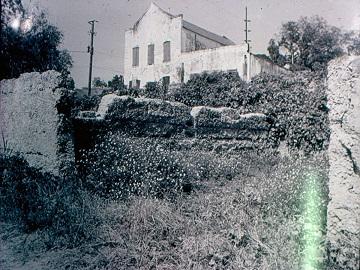
Section Branding
Header Content
Remembering The Burning Of Darien
Primary Content

Georgia is still a year away from its biggest battle anniversaries as the nation marks 150 years since the Civil War.
But this Saturday on Georgia’s coast, residents will remember a controversial war act.
On June 11th, 1863, the Union military took torches to the undefended town of Darien and burned it to the ground.
Darien today is known for its picturesque working waterfront.
Shrimp boats ply the waters of the broad Altamaha River delta while event organizer Missy Brandt points out historic buildings lined up closely side by side along the water.
"To kind of give you a visual picture, kind of envision if you’re standing on River Street in Savannah," says Brandt.
One of the waterfront's most striking features is a set of gray ruins.
They're the hollowed out, nearly 200-year-old remains of a warehouse, made of oyster shell and lime.
"Everything burned," Brandt says. "You can see brick ruins. Just the foundations survive today."
The ruins are a prominent scar left from the day when soldiers set Darien aflame.
The coastal village's 500 inhabitants already had fled.
Coastal historian Buddy Sullivan says U.S. Colonel and ardent abolitionist James Montgomery ordered the town's destruction because it was undefended and convenient.
"He said, 'I will burn this town and we will scourge Darien and set an example to the rest of the South,'" says Sullivan.
The attack was controversial even in the north because of the wholesale destruction of civilian infrastructure, including churches and schools.
This was a year before General William T. Sherman's destructive March to the Sea from Atlanta to Savannnah.
The National Trust for Historic Preservation's James McGill recently spoke in Savannah dressed in the uniform of one of the soldiers who torched Darien.
"It is a blue uniform with a dark blue hat," says McGill.
The hat emblem has a bugle representing the 54th Massachusetts Volunteers.
That was an African-American unit fighting for the Union.
The soldiers' race made the attack particularly galling in the South.
McGill says, the soldiers carried out the burning under protest and later made their country proud in a suicidal mission in South Carolina.
"They wanted to prove themselves as soldiers," says McGill. "They didn’t want to want to wage war against women and children as they did in Darien, Georgia. And that opportunity to prove themselves really did come on July 18th of 1863 on Morris Island.”
The 1989 film Glory with Matthew Broaderick and Morgan Freeman tells the regiment's story including its dramatic charge leading an unsuccessful attack on a Confederate stronghold near Charleston.
The movie was shot on Georgia's coast.
Savannah filmmaker Leon Watkins recalls the filming as he walks the Jekyll Island beach where Glory's South Carolina battle scene was shot.
"Air rams that they used to toss the people into the air. Stunt men, falling and dying. The fighting hand-to-hand," says Watkins.
Watkins was the regiment's flag-bearer in the movie.
An ex-Marine, he says Darien's burning -- like the rest of the war's destruction -- was the high price paid for today's prosperity.
"One has to serve to understand the fact that freedom is not free," says Watkins. "It does cost."
Organizers of this weekend's activities -- including a living history encampment and boat tours -- are focusing on the town's rebuilding as a major theme.
Still, there is the matter of remembering utter destruction.
Missy Brandt says while the event is called a festival, it will be reverential and centered around the only structure that survived the blaze.
"The heart of the 150th commemoration, we will actually have a re-enactment in front of the Strain Building," Brandt says.
But will the re-enactment involve fire?
"Not that much fire at all," Brandt says. "More like memorial torches."
The next major Civil War anniversary in Georgia is a Confederate victory in northwest Georgia, the Battle of Chickamauga, in September.
The big 1864 Atlanta campaign anniversaries are all next year.
The burning of Darien was featured on this link on Today in Georgia History.
Tags: Jekyll Island, Altamaha River, Civil War, GPBnews, Darien, orlando montoya, National Trust for Historic Preservation, Buddy Sullivan, missy brandt, James McGill, Glory, Matthew Broderick, Morgan Freeman, Leon Watkins
Bottom Content

